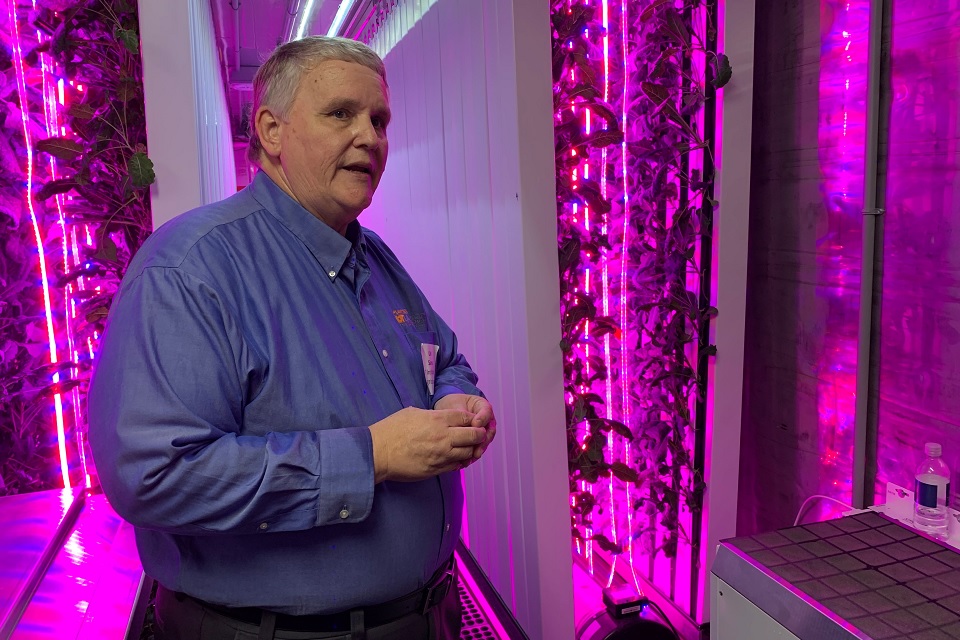
Kale Grown in a Storage Container to be Donated to Charity
KNOXVILLE, Tenn. – Farmers don’t need sunshine to produce abundant food. Ideal growing conditions can be duplicated indoors, using lights. The University of Tennessee Institute of Agriculture is teaming with utility and energy agencies to research ways to grow nutritious crops inside a new facility – a so-called “fresh electric farm.”
The fresh electric farm is a way to produce quality crops while reducing both carbon and acreage footprints. The “farm” is inside a large shipping container, and the first crop being studied is kale. The plants were started as seedlings and will be finished in tall columns under bright, purple LED lights. The purple hue comes from light energy that’s 80% red and 20% blue, broken down this way to aid photosynthesis.
On October 10, UTIA leaders and representatives of the partnering organizations formally celebrated the opening of the facility, which has been three years in the planning. Located on the UTIA campus in Knoxville near a cluster of greenhouses, the container-based farm is a project being coordinated by Carl Sams, UTIA distinguished professor and plant physiologist, with support from the Tennessee Valley Authority, the Knoxville Utilities Board and the Electric Power Research Institute. These agencies specialize in the generation, use and conservation of energy, all key to successful indoor farming.
The project demonstrates the potential of crop management technologies and energy profiles in controlled environment production. The farming of the future will likely involve growing more food for more people on fewer acres and with reduced resources, and the fresh electric farm follows that model.
“We will be documenting the nutritional quality and the yield of the food that we produce in that facility,” says Sams. “The heat source for the plants will be the heat radiating off the lights and the other motors and pumps and so forth in the container, so there’s no outside heating needed to grow the plants. We’re sitting here growing kale in record-breaking heat (outdoors) because we’re controlling the temperature, we’re controlling the amount of light, and we’re controlling what time of day the light comes on.”
Sustainability researcher Morgan Scott with EPRI say this project perfectly fits their organization’s goal of producing food while reducing the strain on the environment or depleting our energy sources. “So indoor agriculture gives us that ability to try new ways to grow food, to produce vegetables and other types of crops,” Scott says. “The average head of lettuce travels 2,000 miles to get to the store shelf. That’s not an insignificant carbon footprint, so if we can move that production locally, create local jobs, and have environmental benefits, that’s a truly sustainable solution.”
The fresh electric farm will also be used by students in the UT Herbert College of Agriculture studying plant sciences as part of their academic training.
When the kale being grown in the electric farm is harvested, it will be donated to Second Harvest Food Bank of East Tennessee.
Through its land-grant mission of research, teaching and extension, the University of Tennessee Institute of Agriculture touches lives and provides Real. Life. Solutions. utia.tennessee.edu.